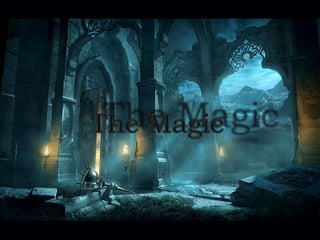Final Presentation
- 1. The Magic
- 2. We can define magic in many different ways We can see the magic from many points of view, because it has extensive explanations and examples; but the more general beliefs are first the belief that magic involves a specific power on the laws governing existence.
- 3. ...and we also have magic as entertainment. Many years ago in ancient times the idea of magic came as a practical annex to the religion.
- 4. Who were the Magicians? Magicians, contrary to what is seen today, were far from being precisely entertainers for moments of leisure. They most of the time occupied important positions in the churches of each culture and were, at once, almost without exception, the most prominent advisers and political rulers.
- 5. It was felt that these people (the magicians) were individuals truly able to understand, connect and manipulate the powers that the gods or God had on earth. They were connecting to the transcendent deity with the existence itself.
- 6. Magic was important?It was extremely difficult that a ruler, official, or any other ranking would oppose to the designs of the representatives of the gods (or God). The state was formed, so for a very delicate balance between the parts, the political and military advisers were taking practical decisions of the government, but in all cases used to meet the necessary rituals and, in turn, submitted their views for consideration by the ministers of magic. This feature was, in ancient times, the common heritage of all cultures, from China (with the escapulomancy (Is a type of osteomancy that involves heating the animal shoulder blades (is a bone) to make cracks and crevices on them in order to guess the future. Used in Asia and North America)) to the tribes of the South Pacific.
- 7. Since when the magic was no longer important?One of the most devastating experiences suffered by the magic (as an institution) was characteristic of medieval Europe. In those years, while the ultimate success and the overall expansion of the Catholic religion (which was then exported to colonies around the world), finally broke the fundamental connection between magic and religion. With the Roman church transformed into the center ruler of all European faith, the bishops and priests decided to eliminate his rival magicians. Prevailed in the popular account that the idea of wizard or witch was not in connection with the worship of divinity, but, on the contrary, strictly task with the devil.
- 8. The magic of todayNow we know that in the past Magic was a power, not a nice combination of tricks. Today is completely different thing. When people think about magic, the most of the times, they are thinking in the word "trick. â In other words; the magician is not longer considered one able to connect with the power of the over world. The magician is neither more nor less than an entertainer. Someone clever, and very witty, whose fundamental role is to entertain an idiotic society by the idea that science will be able to explain everything. People are going to see magic with the sole intention to relax and have fun, no longer to understand the why of things, or connect with higher powers.








